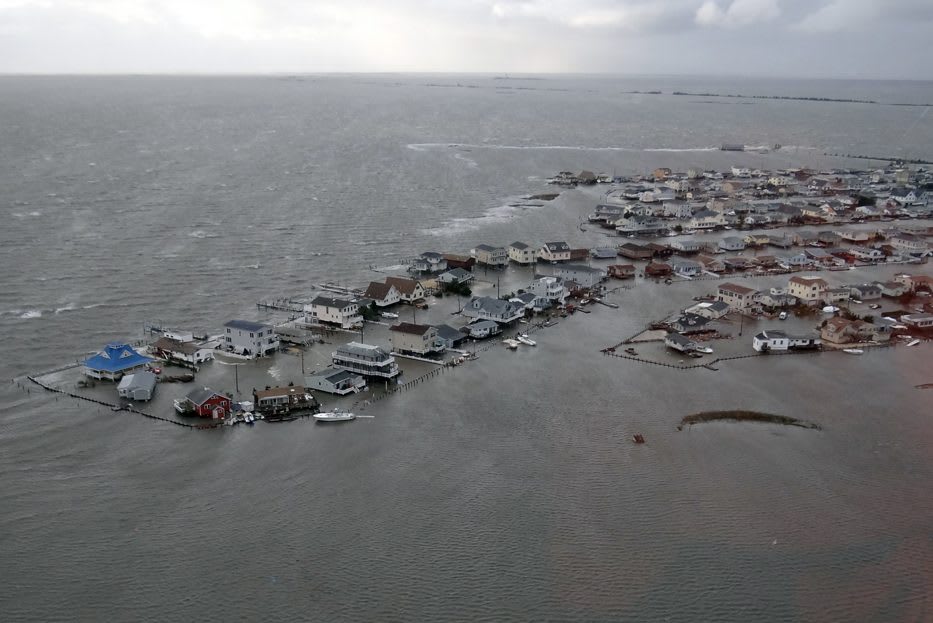Israel and the United States have had a lot in common recently. While rockets rain down on southern Israel, torrential rain and havoc-wreaking winds have cruelly visited the eastern coast of the United States.
As a victim of Hurricane Agnes in June of 1972, wherein the deluged Susquehanna River broke through its dikes and flooded Wyoming Valley in Pennsylvania, I empathize with all those who have been hit in some way by Hurricane Sandy. My heart goes out for those who have lost loved ones, for those who were injured and for those that have suffered economic catastrophe.
But while there were weather warnings for days before Hurricane Sandy struck her mighty and destructive blows and which enabled millions of people to prepare themselves for the onslaught of the hurricane, the situation in Israel is very different. Here in Israel we don’t receive a rocket forecast. Usually a siren warns Israelis to take cover within fifteen to thirty seconds. Not everyone has a nearby shelter to shield them.
I recently saw photos that didn’t make it into most publications and news web sites. One photo shows frightened children and teens in an empty sewer pipe situated in the mobile home community of Nitzan. Nitzan is comprised of many former Gush Katif (Gaza) residents who were thrown out of their home during the so-called disengagement. I saw a photo of school girls hovering beside their school bus. I saw a scared child crouching next to a wall as a uniformed and helmeted Israeli man stood a few feet away.
Each time I listen to the news, I pray that the news won’t begin with an announcement of casualties in southern Israel or in the North for that matter. Miraculously, most of the missiles land in open areas without maiming or killing people, but the psychological toll has been great. Many Israelis live in daily fear. One never knows when missiles will rain down.
Our younger daughter Devorah, who is eighteen years old, is currently doing her first year of two as a National Service volunteer. Her first choice was to work in a day care center for handicapped infants and toddlers in Netivot, in the South. (After work she learns in a midrasha /yeshiva for women which is on the outskirts of Netivot.)
There are two groups of young children in the daycare center. One group is comprised of five infants and three regular staff members. Devorah works in the second group which has nine young children and five regular staff members.
So let’s say that there is a siren and the staff has thirty seconds to pick up their precious charges and run to safety. Will they succeed? No, they won’t because the daycare center is in a one-story house without a bomb shelter.
One evening while Devorah was attending a training session at the daycare center there was a siren. Her supervisor, whose husband was present, went into shock. She didn’t come to work for a while after that.
One morning at 5:00 Devorah and the other young National Service volunteers were rudely awakened by a siren warning them of an impending missile strike. They rushed down to the bottom floor of the building. They heard a boom and the building shook.
It turned out that the missile had landed in the field between their building and the grave of the famed tzadik (righteous person) known as the Baba Sali, which means “praying father”. The Baba Sali, Rabbi Yisrael Abuhatzeira, 1890-1984, was a Moroccan-descent rabbi and kabbalist. He was so revered that 100,000 attended his funeral.
I recently spoke to my daughter and asked her what is happening in Netivot. She told me that despite the dozens of rockets fired from Gaza during the last few days, none fell in Netivot. While the school systems in Be’er sheva, Ashkelon, etc. were closed, the city of Netivot’s schools are in session. Devorah said very matter-of-factly, “It’s because of the Baba Sali.”
I do believe in the powers of tzadikim, but I wanted to check the records for those who have less faith. What I found is that of those rockets which did find their way to Netivot, most of them landed in open areas. There have been rocket attacks in which people were injured physically or psychologically, but I did not see any mention of people in Netivot being killed due to rocket attacks from Gaza.
Jewish sources teach us that events that occur in other parts of the world all have a connection to and an impact on Israel and on the Jewish Nation. I heard a rabbi speaking on the radio who said that “natural” disasters such as earthquakes and hurricanes point to the lack of unity among us Jews. It’s definitely something to ponder.
Adina Hershberg
The words of this author reflect his/her own opinions and do not necessarily represent the official position of the Orthodox Union.
